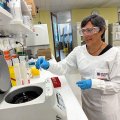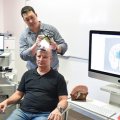France’s new Université Paris-Saclay mega-university will today (7 September, in Paris) partner with The University of Queensland in an Australian first that builds on aerospace research links.
Université Paris-Saclay, established by the French Government, is a scientific and technological cluster of 18 organisations that conduct 15 per cent of France’s research.
UQ Vice-Chancellor and President Professor Peter Høj said a memorandum of agreement to be signed in Paris today would extend research collaboration and academic exchange between Université Paris-Saclay and The University of Queensland.
“UQ has well-established links with the institutions that have formed Paris-Saclay, including Europe’s largest fundamental science agency, the French National Center for Scientific Research,” Professor Høj said.
“We look forward to pursuing new ways to strengthen these links and cement a valuable long-term relationship.”
Paris-Saclay is home to two Nobel laureates and six Fields medallists.
The memorandum of agreement falls under the auspices of CentraleSupélec (CS), one of the founding member of Université Paris-Saclay.
CentraleSupélec President Hervé Biausser said there was a long history of academic and research collaboration between UQ, CS and other Université Paris-Saclay members.
“We are very honoured to host the signature of this strategic memorandum of agreement between UQ and Université Paris-Saclay that strongly enhances the Franco-Australian ties,” he said.
UQ has also joined forces with Paris-Saclay for its first joint research symposium with an international partner, building on existing research ties with the UQ Centre for Hypersonics.
Centre Director Professor Richard Morgan said the Franco-Australian Symposium on Hypersonics and High Enthalpy Flows, which runs from 9 to 11 September, would seek to identify the best path to address future aerospace challenges.
“Our partnership with Paris-Saclay is enhanced by an association with Airbus Defence and Space, which has helped target our fundamental research programs towards the critical issues faced by the aerospace industry,” Professor Morgan said.
“Together we are working on critical technologies for humankind’s continuing exploration of the solar system, and for the development of a global rapid transport network.
“The future of space exploration and colonisation is currently limited by the key issues of cost and safety.
“It is somewhat like early days of global exploration when the risks and uncertainties of expeditions would deter all but a pioneering and foolhardy few.
“The UQ Centre for Hypersonics has a long track record of research achievements, including developments in thermal protection systems needed for survival at hypersonic speeds.
The centre offers the free online course Hypers301x Hypersonics - from shock waves to scramjets, on the UQx Massive Online Open Course (MOOC) platform.
Media: UQ Deputy Director Global Engagement Dr Jessica Gallagher, j.gallagher@uq.edu.au, 0435 961 173; UQ Centre for Hypersonics Director Professor Richard Morgan, r.morgan@uq.edu.au.
.jpg)












